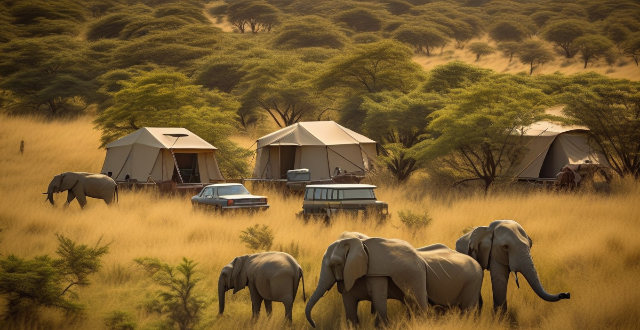Planning a successful wildlife safari trip requires careful research, hiring a reputable tour operator, packing appropriately, and being prepared for unexpected circumstances. Consider factors such as destination selection, weather conditions, itinerary inclusions, appropriate clothing, essential items, flexibility, and safety guidelines to ensure a safe and enjoyable experience while exploring the beauty of nature's wildest creatures.

How to Plan a Successful Wildlife Safari Trip
Planning a wildlife safari trip can be an exciting and rewarding experience, but it requires careful planning and consideration of various factors. Here are some tips on how to plan a successful wildlife safari trip:
Research Your Destination
- Choose your destination wisely: Consider the type of animals you want to see and research which countries or regions are known for those species. For example, if you want to see lions, consider going to Africa's Serengeti National Park in Tanzania or Maasai Mara National Reserve in Kenya.
- Check the weather conditions: Make sure to check the weather conditions before booking your trip, as certain seasons may have better chances of spotting wildlife. For instance, the dry season is typically the best time for wildlife viewing in many African countries.
Hire a Reputable Tour Operator
- Look for reviews and recommendations: Look for reviews from previous travelers and ask for recommendations from friends or family who have gone on similar trips. This will help you find a reputable tour operator that provides quality services and has good knowledge of the area.
- Consider the itinerary and inclusions: Check the itinerary and inclusions offered by the tour operator to ensure they align with your interests and budget. Some packages may include accommodations, meals, transportation, and guided tours, while others may only offer transportation and basic amenities.
Pack Appropriately
- Dress comfortably and practically: Dress in comfortable, lightweight clothing that allows for ease of movement and protects against sunburn and insect bites. Avoid bright colors that may attract animals.
- Bring essential items: Bring essential items such as binoculars, camera equipment, sunscreen, insect repellent, hat, sunglasses, and sturdy walking shoes. It's also important to bring enough water and snacks for the duration of your trip.
Be Prepared for Unexpected Circumstances
- Stay flexible: Be prepared for unexpected circumstances such as changes in weather conditions or unforeseen delays. Stay flexible and open-minded throughout your trip.
- Follow safety guidelines: Follow all safety guidelines provided by your tour operator and local authorities. This includes staying within designated areas, avoiding contact with wild animals, and not littering or disturbing the natural environment.
In conclusion, planning a successful wildlife safari trip requires careful research, hiring a reputable tour operator, packing appropriately, and being prepared for unexpected circumstances. By following these tips, you can ensure a safe and enjoyable experience while exploring the beauty of nature's wildest creatures.